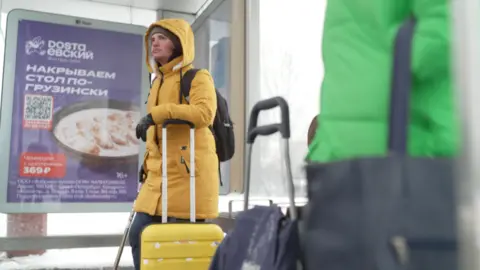Russian court bans 'LGBT movement'
 Reuters
ReutersRussia's Supreme Court has declared what it calls "the international LGBT public movement" an extremist organisation and banned its activities across the country.
The ruling was prompted by a motion from the justice ministry, even though no such organisation exists as a legal entity.
The hearing was held behind closed doors, but reporters were allowed in to hear the court's decision. Nobody from "the defendant's side" had been present, the court said.
Russia's constitution was changed three years ago to make it clear that marriage means a union between a man and a woman. Same-sex unions are not recognised here.
Ahead of the ruling, I asked Sergei Troshin, a municipal deputy in St Petersburg who came out as gay last year, what effect it would have.
"I think this will mean that anyone whom the state considers an LGBT activist could receive a long prison sentence for 'participating in an extremist organisation'," he said.
"For the organiser of such a group, the prison term will be even longer.
"This is real repression. There is panic in Russia's LGBT community. People are emigrating urgently. The actual word we're using is evacuation. We're having to evacuate from our own country. It's terrible."
In recent years Russia's LGBT community has come under increasing pressure from the authorities. In 2013, a law was adopted prohibiting "the propaganda [amongst minors] of non-traditional sexual relations".
Last year, those restrictions were extended to all age groups in Russia. References to LGBT people have been deleted from books, films, adverts and TV shows. Earlier this month, one Russian TV channel discoloured a rainbow in a South Korean pop video, to avoid being accused of violating the "gay propaganda" law.
At the Duma, the lower house of the Russian parliament, Vitaly Milonov, a famously homophobic MP from the ruling party, United Russia, said the ban on LGBT groups was "not about sexual minorities or the private life of individuals".
"It's more about the political agenda proclaimed by this LGBT international movement," he told me.
"They have their own tasks, their own goals. They act as a political force, a political structure and the goals of this structure contravene the Russian Constitution."
"You talk about a political structure," I responded. "But there isn't a movement called the 'International LGBT public movement.' How can you ban something that doesn't exist?"
"Oh, it's easy," Mr Milonov replied. "We can ban any activities from LGBT international organisations here in Russia. That's nice. We don't need them.
"And I'm looking forward to the next step: banning the six-colour rainbow flag. We don't need this flag. It's a symbol of the fight with the traditional family. I hope that no-one can show this flag in Russia."
Under Vladimir Putin, the Kremlin has embraced an ideology centred around conservative thinking and "traditional family values". The authorities portray LGBT activism as something inherently Western and hostile to Russia. Pressure on the LGBT community is presented as a means of defending the moral fabric of Russia.
And is it also a potential vote winner?
"I think [the court hearing] is linked to the presidential election next March," believes Sergei Troshin. "[The authorities] are creating an artificial enemy."
"They say 'We are battling the West'. The battle with LGBT people fits in with this anti-Western rhetoric. Fighting both the West and the LGBT community is popular amongst the conservative, anti-Western part of society. So this topic will be pushed in the run-up to the election."
"They're trying to distract attention from more important problems, which the Russian authorities don't want people to think about," says Maxim Goldman. He works for a Russian organisation that has been offering support to transgender and non-binary people.
"As soon as we heard about the Supreme Court hearing, the people who run our organisation realised we would have to leave the country urgently. It became an emergency."

I spoke to Maxim, who identifies as non-binary, on his final day in Russia. He had packed a small suitcase and was about to head to the airport.
"I feel totally rejected by my own country," said Maxim, who uses male pronouns in Russian. "We're supposed to have a democracy here. The people we put in power are supposed to take care of us.
"But the opposite is happening. They're punishing us. They're wiping their feet on us. I'm being forced out."
For now, municipal deputy Sergei Troshin is staying. But he has no illusions.
"I have spoken a lot in the past about LGBT rights," Sergei tells me. "It's possible this will be enough to launch a criminal case against me. I hope not, but maybe. And this is terrifying.
"Russian society is soaked in fear. With every word you're crossing a mine field. Say one thing and it might land you in prison for five years; say something else, and you'll get 10 or 15 years behind bars."
